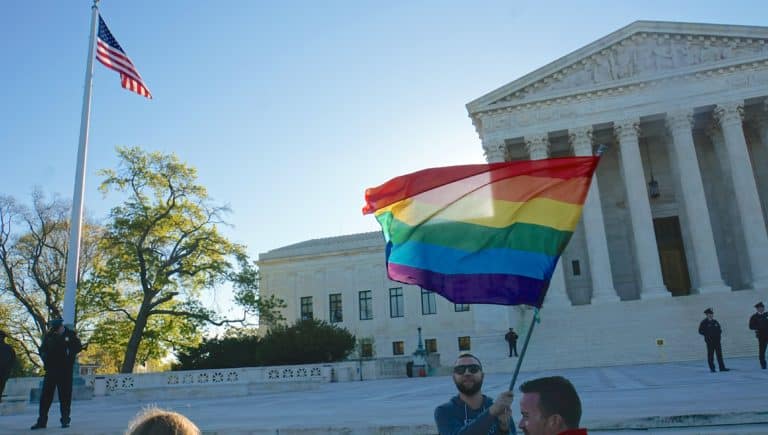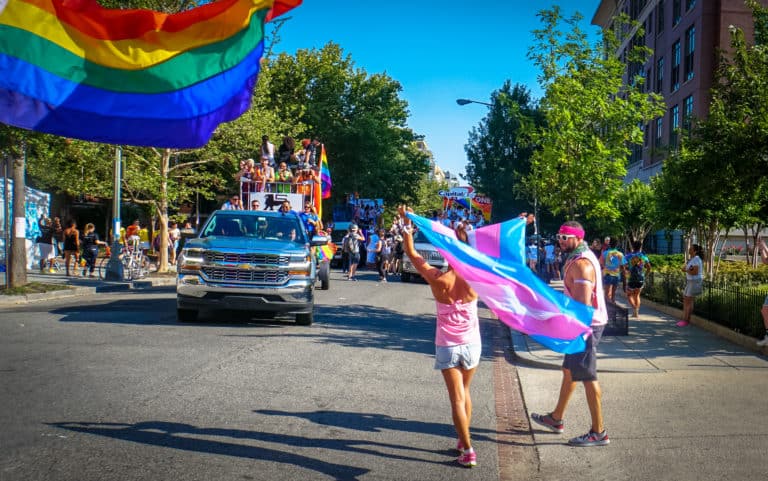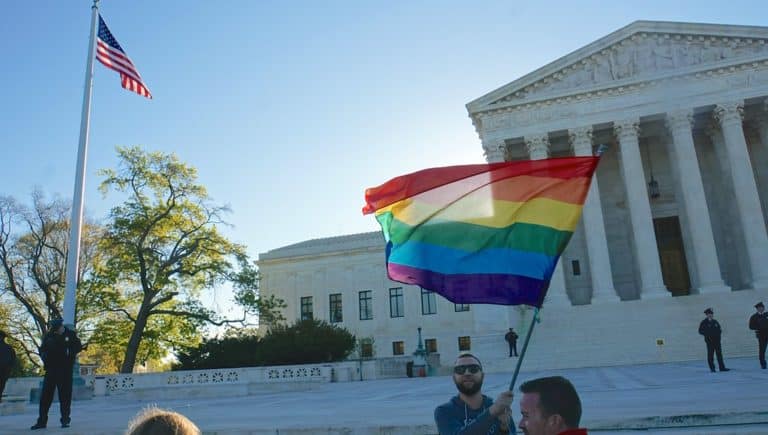After the passing of Justice Antonin Scalia earlier this year, many rushed to evaluate his legacy (for good or for bad). While Justice Scalia’s missing vote in Freidrichs v. California Teachers Association drew a great deal of immediate attention, few discussed the lasting impact of his decisions on employment law. In this realm, one of the most frequent criticisms of Justice Scalia’s jurisprudence was that his decisions tended to restrict plaintiffs’ rights (such as Wal-Mart v. Dukes). However, in Oncale v. Sundowner Offshore Services, Inc., Justice Scalia actually extended Title VII protections to cover same-sex sexual harassment claims.
When the Oncale decision was announced in 1998, it was widely praised for sending a message that ”male or female, gay or straight, nobody should have to face sexual harassment when they go to work in the morning.” In reality, the decision only had a limited immediate impact, and became more notable for what it did not do. Since Oncale, lower courts repeatedly interpreted the decision as a bar to Title VII claims on the basis of sexual orientation. Now, years later, many, including the EEOC, believe Oncale actually opened the door to further expansions of Title VII protections.
The Case: Oncale v. Sundowner Offshore Services, Inc.
In a case with a particularly egregious set of facts, the petitioner, Joseph Oncale, was part of an eight-man crew on an oil platform in the Gulf of Mexico. It was alleged that Oncale’s male co-workers repeatedly subjected him to sexually charged humiliation, including sexual assaults and threats of rape. Even though Oncale complained to his supervisors, no remedial action was taken. Oncale eventually quit and asked that his pink slip reflect that he “voluntarily left due to sexual harassment and verbal abuse.” Despite the overwhelmingly powerful facts, the district court and the Fifth Circuit found that, as a male, Oncale had no cause of action under Title VII for harassment by male co-workers.
In Oncale, Justice Scalia, writing for a unanimous Court, overturned the Fifth Circuit and held that Title VII’s prohibition of “discriminat[ion]… because of… sex” applies to workplace harassment where the harasser and the harassed employee are of the same sex. Justice Scalia explained that Supreme Court precedent indicated that Title VII protections were not limited to a narrow reading of “terms” and “conditions” of employment, and extended to situations in which the plaintiff is subjected to such a hostile work environment that it alters the terms and conditions of employment (relying on Meritor Savings Bank v. Vinson and Harris v. Forklift Systems). Justice Scalia also added that Title VII’s prohibition of discrimination “because of… sex,” protects men and women alike.
Although Justice Scalia conceded, “male-on-male sexual harassment in the workplace was assuredly not the principal evil congress was concerned with when it enacted Title VII,” he found no justification in the statutory language of Title VII to bar claims of same-sex harassment. In an especially significant passage, Justice Scalia went on to explain that “statutory prohibitions often go beyond the principal evil to cover reasonably comparable evils, and it is ultimately the provisions of ours laws rather than the principal concerns of our legislators by which we are governed.”
Justice Scalia also found that lower courts had, in the past, erroneously limited same-sex harassment cases to situations in which the plaintiff could establish that the harasser was homosexual (and therefore presumably motivated by sexual desire). He held that “sexual desire” was not a prerequisite to prove discrimination on the basis of sex.
Justice Scalia ultimately held that Title VII’s text calls for an evaluation of claims on the critical issue of “whether members of one sex are exposed to disadvantageous terms of conditions of employment to which members of the other sex are not exposed.” However, the opinion only provided limited guidance on this “critical issue.” Justice Scalia ultimately left it up to “common sense, and an appropriate sensitivity to social context” to identify actions that constitute unlawful sexual harassment.
The Lasting Legacy of Oncale
At the time of the decision, many looked upon Justice Scalia’s opinion with either cautious optimism or unbridled skepticism. Although the Court’s opinion in Oncale unquestionably broadened Title VII rights, it was unclear what sort of impact it would have. Commenting on the decision’s careful tiptoe around the issue of discrimination on the basis of sexual orientation, one employment lawyer told the New York Times that it was “most important to understand what it doesn’t say.” Professor Kathryn Abrams referred to the decision as “an enigma,” stating that Justice Scalia skirted the important issues in “an effort to give a conclusive answer to a case that, by all appearances, he would have preferred not to have had to consider.”
Despite a widely skeptical response from legal scholars, some felt the case clearly broadened Title VII protections. Professor Catherine Lanctot urged that the decision be taken “at face value, as a victory for a plaintiff who alleged particularly egregious harassment.” Professor Lanctot added that the “holding represents a significant step forward in sexual harassment jurisprudence.” In a U.S. News and World Report column, John Leo speculated that the decision “opens the door to a flood of litigation that could convert existing sexual harassment doctrine into the rough equivalent of a gay civil rights law.” That being said, he also noted that Justice Scalia and the Court seemed “to have gone out of its way to pick a same-sex case that does not involve homosexuals.”
The critics were not wrong, Justice Scalia’s opinion laid out a facially neutral test that did not take sexual orientation into consideration. While plaintiffs still had the option to bring “sex stereotyping” discrimination claims, under the Court’s 1989 decision in Price Waterhouse v. Hopkins (a case in which Justice Scalia joined the dissent), this route proved relatively unsuccessful. For years, lower courts relied upon the limited language in the opinion as precedent that Title VII protections did not extend to discrimination on the basis of sexual orientation.
It was not until relatively recently that more began to view Justice Scalia’s Oncale decision as an important step in the direction of protection for sexual orientation under Title VII. One writer explained that Justice Scalia’s language in the decision paved the way for the EEOC determination that discrimination on the basis of sexual orientation was already illegal under Title VII. To accomplish this, the EEOC has relied upon Justice Scalia’s comment in Oncale, that “statutory prohibitions often go beyond the principal evil to cover reasonably comparable evils.” Sure enough, in 2015, the EEOC issued an opinion in David Baldwin v. Dep’t of Transportation, which used Justice Scalia’s language to reach this conclusion.
Thus, even though the Oncale decision carefully avoided expanding the reach of Title VII to cover sexual orientation, Justice Scalia’s reasoning may have left an opening for a broader interpretation that some are currently applying. As sexual orientation discrimination cases make their way through the courts, we will find out whether others are persuaded that Justice Scalia’s decision calls for a broader expansion of Title VII protections.









Daily News & Commentary
Start your day with our roundup of the latest labor developments. See all
June 30
Antidiscrimination scholars question McDonnell Douglas, George Washington University Hospital bargained in bad faith, and NY regulators defend LPA dispensary law.
June 29
In today’s news and commentary, Trump v. CASA restricts nationwide injunctions, a preliminary injunction continues to stop DOL from shutting down Job Corps, and the minimum wage is set to rise in multiple cities and states. On Friday, the Supreme Court held in Trump v. CASA that universal injunctions “likely exceed the equitable authority that […]
June 27
Labor's role in Zohran Mamdani's victory; DHS funding amendment aims to expand guest worker programs; COSELL submission deadline rapidly approaching
June 26
A district judge issues a preliminary injunction blocking agencies from implementing Trump’s executive order eliminating collective bargaining for federal workers; workers organize for the reinstatement of two doctors who were put on administrative leave after union activity; and Lamont vetoes unemployment benefits for striking workers.
June 25
Some circuits show less deference to NLRB; 3d Cir. affirms return to broader concerted activity definition; changes to federal workforce excluded from One Big Beautiful Bill.
June 24
In today’s news and commentary, the DOL proposes new wage and hour rules, Ford warns of EV battery manufacturing trouble, and California reaches an agreement to delay an in-person work mandate for state employees. The Trump Administration’s Department of Labor has advanced a series of proposals to update federal wage and hour rules. First, the […]